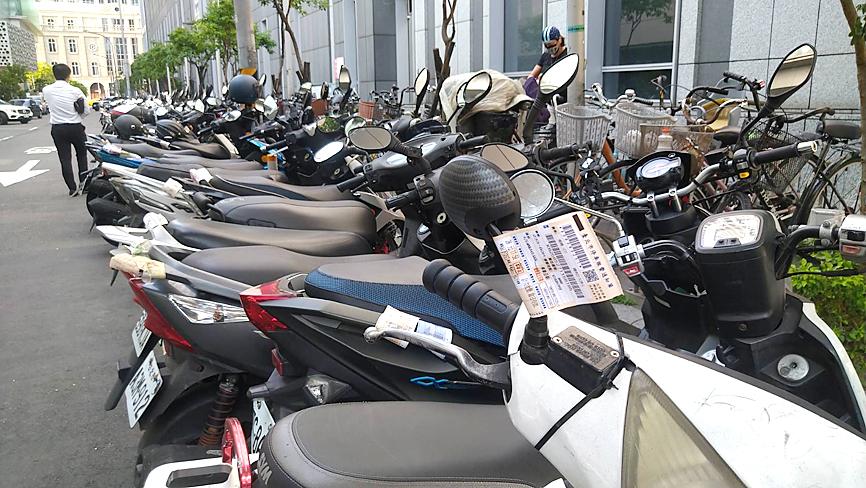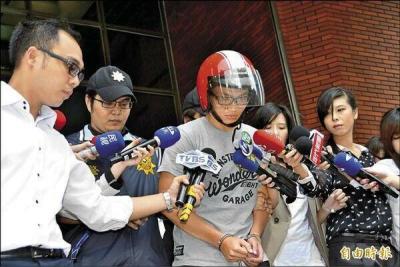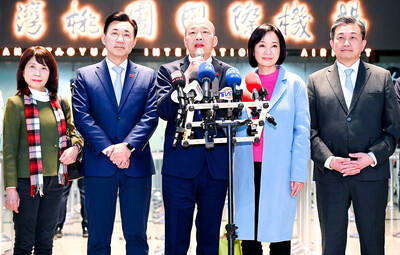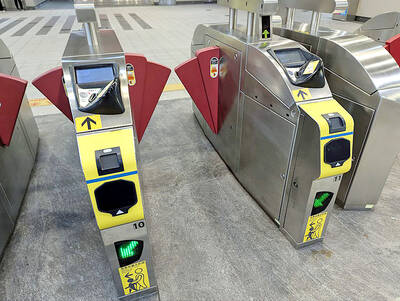Scooter riders in Taipei can now pay NT$400 per month for unlimited parking in all of the city’s parking spaces, the Taipei Parking Management and Development Office said.
Transportation Management Division section chief Lo Chih-hao (羅至浩) on Tuesday said the office has launched two new scooter parking measures to lower expenses for riders.
The city charges NT$20 for scooter parking near 16 designated shopping districts, according to the office’s Web site.

Photo: Tsai Ya-hua, Taipei Times
The monthly parking pass can be purchased by filling out a form on the office’s Web site, Lo said, adding that buyers can pay with cash at designated parking lots or through the Pi mobile wallet app or Autopass.
People who pay digitally are to receive a NT$100 discount, he said.
Passes for the following month would be available to purchase starting from the 25th of each month, Lo said.
The office has discontinued its previous three monthly passes, which allowed unlimited scooter parking in areas near the Neihu Science Park, Songshan Railway Station and Shilin Night Market respectively, he said.
The office also said that starting from Sep. 7, riders would only be charged one parking fee per day, no matter how many places the same scooter is parked.
Parking authorities are to check a scooter’s plate number before issuing a ticket to avoid double billing, Lo said.
The new measures benefit scooter riders, as the monthly pass allows people who ride every day to stop receiving daily bills, while those who only ride occasionally, but travel between areas, would only need to pay one fee instead of NT$20 every time they park in a city space, Taipei Department of Transportation Director Chen Hsueh-tai (陳學台) said.
The policy of not billing electric scooters for parking remains in place as part of the city’s efforts to promote green energy, Lo said.
Until the number of registered electric scooters exceeds 13.5 percent of all registered scooters in the city, electric scooter parking would remain free to encourage people to replace fuel-inefficient scooters with green ones, he said.
The office started charging for scooter parking last year to address the large number of scooters parked on city streets, and started with 16 designated shopping districts, as the first part of a four-stage plan, he said.
The goal is to charge for scooter parking everywhere in the city, he added.
The second stage is to begin on Sept. 7, when the office is to charge for scooter parking in 6,500 spaces near MRT stations from Longshan Temple Station to Kunyang Station on the Bannan Line (Blue Line), Lo said.
Parking spaces in downtown areas along the Tamsui-Xinyi Line (Red Line) would be included by the end of the year, he added.
The third stage would expand paid parking to spaces along main roads in the city, and the fourth phase would add spaces along minor roads to cover all areas in the city, he said.

Death row inmate Huang Lin-kai (黃麟凱), who was convicted for the double murder of his former girlfriend and her mother, is to be executed at the Taipei Detention Center tonight, the Ministry of Justice announced. Huang, who was a military conscript at the time, was convicted for the rape and murder of his ex-girlfriend, surnamed Wang (王), and the murder of her mother, after breaking into their home on Oct. 1, 2013. Prosecutors cited anger over the breakup and a dispute about money as the motives behind the double homicide. This is the first time that Minister of Justice Cheng Ming-chien (鄭銘謙) has

BITTERLY COLD: The inauguration ceremony for US president-elect Donald Trump has been moved indoors due to cold weather, with the new venue lacking capacity A delegation of cross-party lawmakers from Taiwan, led by Legislative Speaker Han Kuo-yu (韓國瑜), for the inauguration of US president-elect Donald Trump, would not be able to attend the ceremony, as it is being moved indoors due to forecasts of intense cold weather in Washington tomorrow. The inauguration ceremony for Trump and US vice president-elect JD Vance is to be held inside the Capitol Rotunda, which has a capacity of about 2,000 people. A person familiar with the issue yesterday said although the outdoor inauguration ceremony has been relocated, Taiwan’s legislative delegation has decided to head off to Washington as scheduled. The delegation

TRANSPORT CONVENIENCE: The new ticket gates would accept a variety of mobile payment methods, and buses would be installed with QR code readers for ease of use New ticketing gates for the Taipei metro system are expected to begin service in October, allowing users to swipe with cellphones and select credit cards partnered with Taipei Rapid Transit Corp (TRTC), the company said on Tuesday. TRTC said its gates in use are experiencing difficulty due to their age, as they were first installed in 2007. Maintenance is increasingly expensive and challenging as the manufacturing of components is halted or becoming harder to find, the company said. Currently, the gates only accept EasyCard, iPass and electronic icash tickets, or one-time-use tickets purchased at kiosks, the company said. Since 2023, the company said it

Another wave of cold air would affect Taiwan starting from Friday and could evolve into a continental cold mass, the Central Weather Administration (CWA) said yesterday. Temperatures could drop below 10°C across Taiwan on Monday and Tuesday next week, CWA forecaster Chang Chun-yao (張竣堯) said. Seasonal northeasterly winds could bring rain, he said. Meanwhile, due to the continental cold mass and radiative cooling, it would be cold in northern and northeastern Taiwan today and tomorrow, according to the CWA. From last night to this morning, temperatures could drop below 10°C in northern Taiwan, it said. A thin coat of snow